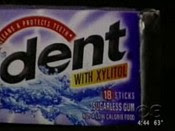
Just read an article posted on Pet Health Care about the rise of Xylitol poisoning in Dogs and I thought it would be a good idea to share some of it with you.
Xylitol is an artificial sweetener that is primarily used as a substitute for sugar in a lot of diet and confectionery products.
Xylitol negatively effects dogs as it is quickly absorbed through their digestive tracts. Xylitol in tiny amounts can potentially cause significant toxic poisoning in dogs. Even just one to two pieces of regular sized chewing gum that contains Xylitol can be potentially toxic to a dog that weighs less than 20lbs. In dogs who have ingested Xylitol, the symptoms are vomiting, diarrhea, lethargy, loss of coordination, pale gums, liver damage/failure, and even seizures. If these symptoms are not immediately treated, Xylitol toxicity may eventually lead to liver failure, blood clotting abnormalities, and possibly death. Therefore it is of extreme importance that you take your dog to a veterinarian immediately if you suspect that he ingested any Xylitol containing product, especially if it has been less than 2 hours as a veterinarian will have better luck in preventing your dog’s body from absorbing it.
As a dog owner you can prevent Xylitol poisoning by removing all consumer products containing Xylitol from your home. Better safe then sorry.





